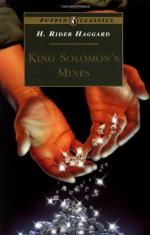“My name is Umbopa. I am of the Zulu people, yet not of them. The house of my tribe is in the far North; it was left behind when the Zulus came down here a ‘thousand years ago,’ long before Chaka reigned in Zululand. I have no kraal. I have wandered for many years. I came from the North as a child to Zululand. I was Cetewayo’s man in the Nkomabakosi Regiment, serving there under the great Captain, Umslopogaasi of the Axe,[*] who taught my hands to fight. Afterwards I ran away from Zululand and came to Natal because I wanted to see the white man’s ways. Next I fought against Cetewayo in the war. Since then I have been working in Natal. Now I am tired, and would go North again. Here is not my place. I want no money, but I am a brave man, and am worth my place and meat. I have spoken.”
[*] For the history of Umslopogaasi and his Axe, the
reader is
referred to the books called
“Allan Quatermain” and “Nada the
Lily.”—Editor.
I was rather puzzled by this man and his way of speech. It was evident to me from his manner that in the main he was telling the truth, but somehow he seemed different from the ordinary run of Zulus, and I rather mistrusted his offer to come without pay. Being in a difficulty, I translated his words to Sir Henry and Good, and asked them their opinion.
Sir Henry told me to ask him to stand up. Umbopa did so, at the same time slipping off the long military great coat which he wore, and revealing himself naked except for the moocha round his centre and a necklace of lions’ claws. Certainly he was a magnificent-looking man; I never saw a finer native. Standing about six foot three high he was broad in proportion, and very shapely. In that light, too, his skin looked scarcely more than dark, except here and there where deep black scars marked old assegai wounds. Sir Henry walked up to him and looked into his proud, handsome face.
“They make a good pair, don’t they?” said Good; “one as big as the other.”
“I like your looks, Mr. Umbopa, and I will take you as my servant,” said Sir Henry in English.
Umbopa evidently understood him, for he answered in Zulu, “It is well”; and then added, with a glance at the white man’s great stature and breadth, “We are men, thou and I.”
CHAPTER IV
AN ELEPHANT HUNT
Now I do not propose to narrate at full length all the incidents of our long travel up to Sitanda’s Kraal, near the junction of the Lukanga and Kalukwe Rivers. It was a journey of more than a thousand miles from Durban, the last three hundred or so of which we had to make on foot, owing to the frequent presence of the dreadful “tsetse” fly, whose bite is fatal to all animals except donkeys and men.
We left Durban at the end of January, and it was in the second week of May that we camped near Sitanda’s Kraal. Our adventures on the way were many and various, but as they are of the sort which befall every African hunter—with one exception to be presently detailed—I shall not set them down here, lest I should render this history too wearisome.




